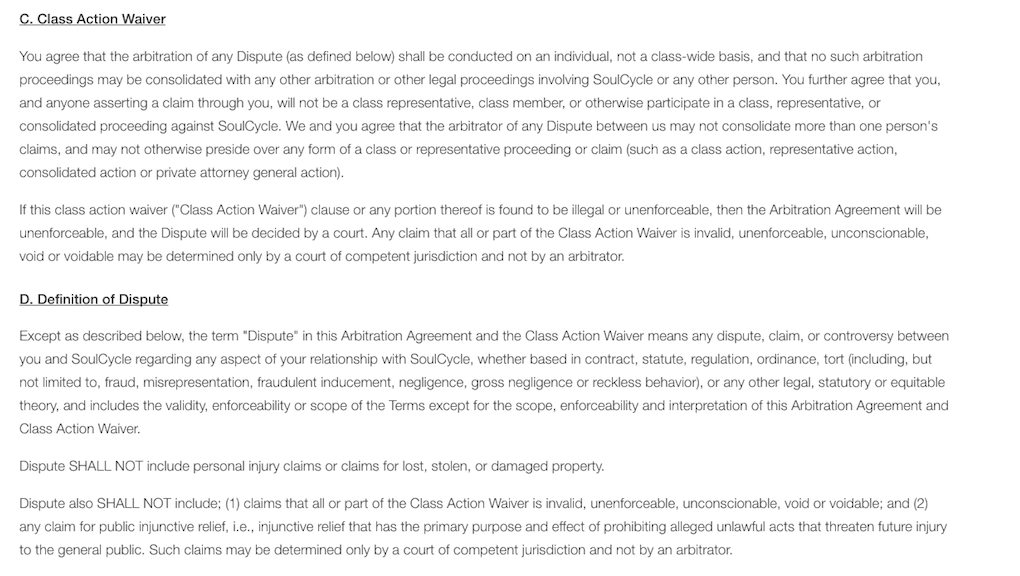Many SoulCycle riders in DC share the experience of saving their pennies, purchasing a package of classes, and scheduling them out. But then plans to sweat off 45 minutes are upended because the passes have expired.
This happened to me last year, just as I was about to register for a class on 14th Street last year. My balance was gone, without so much as a heads-up from SoulCycle.
But last week, I got an email saying that I might be able to get $25 to $50 back, either in SoulCycle credits or cash. The email was in reference to a federal class-action suit against the fitness company that was preliminarily approved June 22 by a judge in California.
For years, SoulCycle has profited off expired packages that customers use to purchase classes, called “series.” Rather than buy seats directly, SoulCycle requires that customers purchase these “series” certificates—even for just a single ride—which are then redeemed for actual reservations. When certificates expire, the company does not offer refunds, and customers lose their remaining balance.
When Los Angeles resident Rachel Cody realized in 2015 that a one-class “series” she had purchased had expired after 30 days, she sued. Cody claimed that SoulCycle’s short expiration periods violated the the Credit Card Accountability Responsibility and Disclosure Act, which mandates that gift cards cannot have an expiration date shorter than five years. The plaintiff also accused SoulCycle of inducing customers to buy more expensive packages with longer shelf lives—a $780 30-class package is good for a year, for instance—but still failing to offer warnings when those series are about to expire.

While SoulCycle’s business practices make it easy for customers to lose money, they’re hardly unheard of in the cut-throat world of fitness chains. In January, Bloomberg reported that the average monthly health club fee paid by gym-goers had increased 17 percent in the past two years, caused in part by a response to competition from boutique gyms like SoulCycle. The money made by selling series has worked in SoulCycle’s favor–S-1 records filed with the Securities and Exchange Commission indicate that the cycling giant made $25 million from series certificates in 2014 alone, although it’s unclear what portion of that revenue came from expired packages that went unused.
The class-action suit, which seeks damages for Cody and all other customers affected by the “unlawful expiration date” of the series certificates, reached a proposed settlement in April. SoulCycle tried to dismiss the case by arguing that series certificates should not be considered gift cards, but was unsuccessful.
If Cody, et al. v. SoulCycle Inc. survives the final hearing in October, SoulCycle customers who had series certificates that expired before they were used will receive up to $50 in credits to the cycling studio. They can also elect to take this money in cash.
Neither the attorneys involved in the case nor a representative from SoulCycle had responded to requests for comment. An employee at the front desk of SoulCycle’s West End location said she could not comment on the suit, but did note that customers can extend their series certificates if they realize their balance is about to expire.
Still, word of the lawsuit is spinning around SoulCycle’s famously loyal customer base. Amanda Kerbel, who was heading into a Tuesday-morning session, said she and her friends had recently been talking about the case after some of them received the email notice about it. Kerbel–said she’s gone to SoulCycle in New York and DC since high school–said she’s had only good experiences with the company.
“They have really good customer service; they’re very good about it,” she said, noting that the studios she attends in DC tend to be understanding of last-minute conflicts, and allow her to reschedule past the standard deadline if necessary. “If I wake up late or get sick, I just call, and they always give me my bike back.”
One of the mantras that SoulCycle proudly displays on its Pinterest board is that “there is no CHANGE without CHALLENGE.” It seems the company took the saying to heart with this particular challenge, as there is a noticeable addition to the Terms and Conditions today that wasn’t there in the months before Rachel Cody sued: Section C, titled “Class Action Waiver,” states that “the arbitration of any Dispute…shall be conducted on an individual, not a class-wide basis,” and that “the arbitrator of any Dispute between us may not consolidate more than one person’s claims.”




















